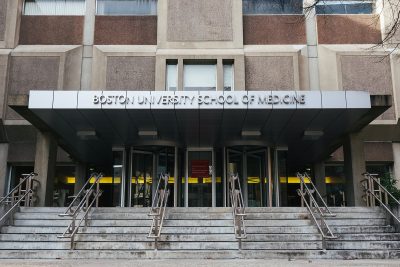
Speakers stood in front of hundreds of miniature tombstones Monday afternoon at Boston University’s Medical Campus, not to just celebrate Halloween, but to represent those who have died from a lack of access to proper health care.
In addition to the festive tombstones, songs such as “Monster Mash” and “Thriller,” blasted from speakers and Halloween inspired posters bearing slogans such as “Treat Not Trick,” the title of the demonstration organized by the BU chapter of Students for a National Health Program.
The crowd included approximately 20 BU medical students, doctors and Massachusetts State Sen. Jamie Eldridge, who all came together in support of a single payer health care system and health care justice in Massachusetts.
Pat Downs Berger, a retired doctor who works with Massachusetts Campaign for Single Payer Health Care, a program dedicated to establishing a single payer system, according to their website, urged the younger attendees to work to change the health care system during her speech at the demonstration.
“You are the people who really are going to make a change,” she said.
Janine Petito, a fourth-year student in the BU School of Medicine, and one of event’s organizers, said she is working to change the current health care system because she wants to be able to treat her patients based on medical need and not financial status.
Petitio said she believes this can only be achieved through a single payer national health insurance that would provide Medicare for all.
“Twenty-nine million Americans are currently uninsured, and a similar number are underinsured,” Petitio said.
Petitio explained that in addition to having a poor national health care program, the United States also has a disproportionate amount of medical debt.
“The United States has the highest rates of medical debt out all the developed countries in the world [and the] highest infant mortality rate in comparison to equally wealthy countries in Europe and elsewhere,” Petito said. “At the end of the day, we are wealthy country and it shouldn’t be this way.”
Andrew Olsen, a second-year student in BUSM, who attended the event, said while the Affordable Care Act is a step in the right direction, America still has a long way to go to establish universal health care.
“[We have] recognized that health care is a human right and … taken action, [but] America has never developed a system that covers everybody,” Olsen said. “Many [are left] without insurance at all.”
Olsen said while the ACA has beneficial tax policies, it does not provide substantial health care to taxpayers.
“One of the biggest downsides of the ACA has been that it has created a new category of underinsurance that allows people to avoid tax penalties, but doesn’t provide that kind of care that keeps them healthy.”
Brad Zehr, a fourth-year student at BUSM, attended the event to show his support for a single payer health care system in the United States because he is unsatisfied with the current system, he said.
“If you spent a day looking at the research regarding our health system and compared that to other advanced, wealthy nations … ours is a complete disaster,” he said.
Zehr added that the current state of health care in the United States discourages him from pursuing a career in medicine.
“The fact that we still can’t find a way to insure everybody affordably and sustainably, the fact that we pay twice as much as a country per person and still can’t give everyone insurance, makes you realize that you don’t want to be a physician in a system that doesn’t make sense,” he said. “You want to be a physician in a system that you’re proud of and treats everyone in the country.”
Heather Sweeney, a first-year student at BUSM, who attended the event, said she supports the single payer system because universal health care should be considered a fundamental human right.
“The health care system as it is now is pretty broken, and it’s sad how many people do not have access to insurance,” Sweeney said. “Health insurance is a right, much like a police department or a fire department.”

